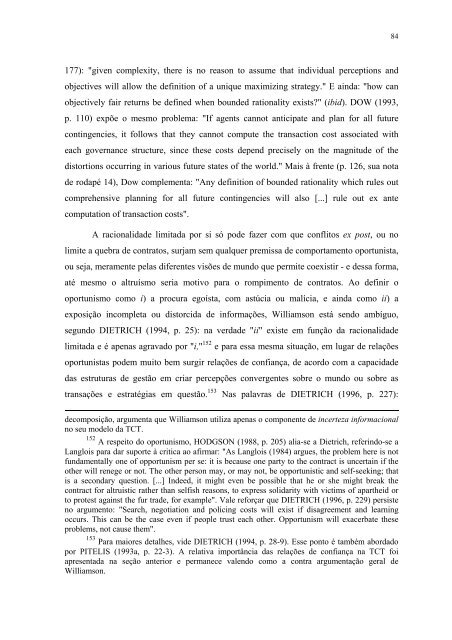Download - Núcleo de Pesquisa em Economia Empresarial ...
Download - Núcleo de Pesquisa em Economia Empresarial ...
Download - Núcleo de Pesquisa em Economia Empresarial ...
Create successful ePaper yourself
Turn your PDF publications into a flip-book with our unique Google optimized e-Paper software.
177): "given complexity, there is no reason to assume that individual perceptions and<br />
objectives will allow the <strong>de</strong>finition of a unique maximizing strategy." E ainda: "how can<br />
objectively fair returns be <strong>de</strong>fined when boun<strong>de</strong>d rationality exists?" (ibid). DOW (1993,<br />
p. 110) expõe o mesmo probl<strong>em</strong>a: "If agents cannot anticipate and plan for all future<br />
contingencies, it follows that they cannot compute the transaction cost associated with<br />
each governance structure, since these costs <strong>de</strong>pend precisely on the magnitu<strong>de</strong> of the<br />
distortions occurring in various future states of the world." Mais à frente (p. 126, sua nota<br />
<strong>de</strong> rodapé 14), Dow compl<strong>em</strong>enta: "Any <strong>de</strong>finition of boun<strong>de</strong>d rationality which rules out<br />
comprehensive planning for all future contingencies will also [...] rule out ex ante<br />
computation of transaction costs".<br />
A racionalida<strong>de</strong> limitada por si só po<strong>de</strong> fazer com que conflitos ex post, ou no<br />
limite a quebra <strong>de</strong> contratos, surjam s<strong>em</strong> qualquer pr<strong>em</strong>issa <strong>de</strong> comportamento oportunista,<br />
ou seja, meramente pelas diferentes visões <strong>de</strong> mundo que permite coexistir - e <strong>de</strong>ssa forma,<br />
até mesmo o altruísmo seria motivo para o rompimento <strong>de</strong> contratos. Ao <strong>de</strong>finir o<br />
oportunismo como i) a procura egoísta, com astúcia ou malícia, e ainda como ii) a<br />
exposição incompleta ou distorcida <strong>de</strong> informações, Williamson está sendo ambíguo,<br />
segundo DIETRICH (1994, p. 25): na verda<strong>de</strong> "ii" existe <strong>em</strong> função da racionalida<strong>de</strong><br />
limitada e é apenas agravado por "i," 152 e para essa mesma situação, <strong>em</strong> lugar <strong>de</strong> relações<br />
oportunistas po<strong>de</strong>m muito b<strong>em</strong> surgir relações <strong>de</strong> confiança, <strong>de</strong> acordo com a capacida<strong>de</strong><br />
das estruturas <strong>de</strong> gestão <strong>em</strong> criar percepções convergentes sobre o mundo ou sobre as<br />
transações e estratégias <strong>em</strong> questão. 153 Nas palavras <strong>de</strong> DIETRICH (1996, p. 227):<br />
<strong>de</strong>composição, argumenta que Williamson utiliza apenas o componente <strong>de</strong> incerteza informacional<br />
no seu mo<strong>de</strong>lo da TCT.<br />
152 A respeito do oportunismo, HODGSON (1988, p. 205) alia-se a Dietrich, referindo-se a<br />
Langlois para dar suporte à critica ao afirmar: "As Langlois (1984) argues, the probl<strong>em</strong> here is not<br />
fundamentally one of opportunism per se: it is because one party to the contract is uncertain if the<br />
other will renege or not. The other person may, or may not, be opportunistic and self-seeking; that<br />
is a secondary question. [...] In<strong>de</strong>ed, it might even be possible that he or she might break the<br />
contract for altruistic rather than selfish reasons, to express solidarity with victims of apartheid or<br />
to protest against the fur tra<strong>de</strong>, for example". Vale reforçar que DIETRICH (1996, p. 229) persiste<br />
no argumento: "Search, negotiation and policing costs will exist if disagre<strong>em</strong>ent and learning<br />
occurs. This can be the case even if people trust each other. Opportunism will exacerbate these<br />
probl<strong>em</strong>s, not cause th<strong>em</strong>".<br />
153 Para maiores <strong>de</strong>talhes, vi<strong>de</strong> DIETRICH (1994, p. 28-9). Esse ponto é também abordado<br />
por PITELIS (1993a, p. 22-3). A relativa importância das relações <strong>de</strong> confiança na TCT foi<br />
apresentada na seção anterior e permanece valendo como a contra argumentação geral <strong>de</strong><br />
Williamson.<br />
84



